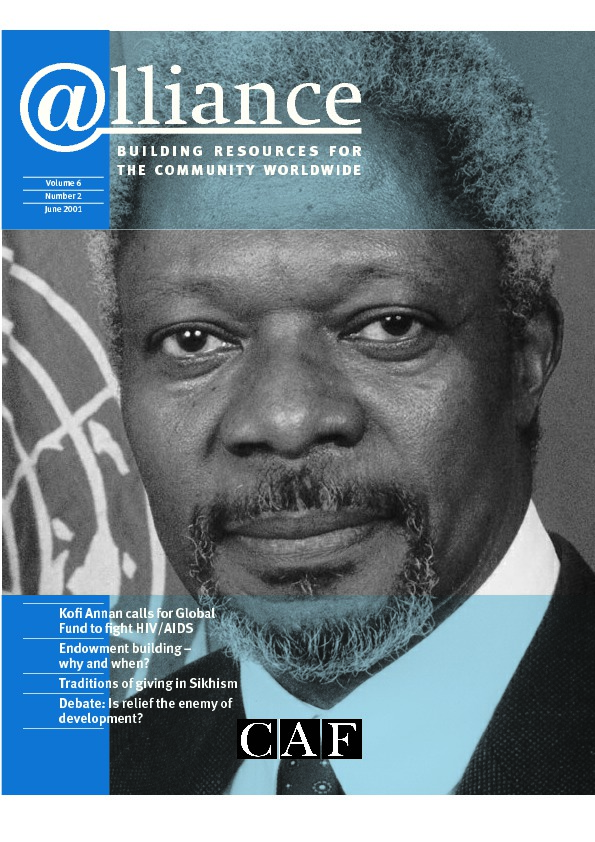Alliance interviewed John Clark, then head of the World Bank NGO Unit, in December 1998. William Reuben took over as head of what is now called the NGO/Civil Society Unit two years ago. Has the work of the Unit changed much in the meantime?
What John Clark said two and a half years ago
John Clark outlined four areas of work the NGO Unit was involved in:
- helping the Bank work more effectively with NGOs;
- developing a positive dialogue with NGOs;
- getting messages out to the NGO world about what the Bank is doing (perhaps more an External Relations function);
- working with governments to encourage a more enabling environment for civil society.
The first change is reflected in the changed name, as Reuben explains: ‘Our work is now with NGOs and civil society, which opens up the scope of the audience. How much difference this will make we are about to find out.’
Another change he describes as one of emphasis: ‘Now our emphasis is more on facilitating relationships at the country level, facilitating dialogue between governments and CSOs.’ This also involves facilitating access to information – on policy issues, on the government’s development policy, to make sure NGOs and CSOs are aware of the main trends in programmes.
This is a key change. The focus is on the policies of CSOs’ own country governments rather than on Bank policies – though Reuben does qualify this: ‘especially policies that the Bank is supporting in those countries. Like PRSPs (Poverty Reduction Strategy Papers) or Structural Adjustment programmes. We want civil society to have a stronger role in the debate and discussion about these programmes.’
Helping governments work with civil society
Another aspect of this is trying to create capacity in governments to enhance their work with civil society. ‘Sometimes governments have the political will to improve their engagement with civil society but don’t have the right instruments, the capacity. So we try to build that capacity.’ Especially in the context of PRSPs, this involves training. The Unit has a series of programmes for governments to help make them aware of best practices in this area. It also aims to give governments information about civil society, and about how to map civil society. This ‘mapping’ is a qualitative matter rather than a matter of developing indicators and indices. ‘It is more about how to map different types of CSO and the different roles they play in order to build effective partnerships.’
The Unit is also piloting new instruments, like participatory public expenditure management, which involves CSOs in the whole budget cycle. This will be piloted in some PRSP countries and probably in the Philippines, though it isn’t a PRSP country. There are different models here. One is the experience of Porto Alegre in Brazil, where the process is very much local government led. Another is the South African one in which an NGO leads to enable stronger participation of civil society in the discussion and tracking of budgets.
‘So this is the major change, how we work with civil society. It’s not only facilitating direct dialogue between the Bank and NGOs on Bank policies and Bank strategies; it is also creating an environment at country level for civil society to engage in public policy decision-making and public policy tracking.’
New forums for dialogue
Another significant change involves the World Bank NGO Committee, which has until now provided the main forum for dialogue between NGOs and the Bank. At the last meeting in December 2000 it was decided that in future there would be an annual Bank Civil Society Thematic Forum. The NGO members of the Committee were rightly perceived as being a somewhat exclusive group, involving always the same NGOs. The Thematic Forums will be both more inclusive and more selective. More inclusive in that overall a broader spectrum of NGOs and CSOs will participate. More selective ‘in the sense that we want organizations that are working in relation to the specific theme and therefore have relevant knowledge and expertise. The small group of NGOs that were involved in the previous Committee wouldn’t have had the expertise to engage fully in issues relating to HIV/AIDS, for example. They were experts on the World Bank, but not on specific issues. The interaction wasn’t really working anymore. They were aware of that.’
There will also be a joint facilitation committee – the Bank and some members of the NGO Working Group on the World Bank, plus other global networking groups. The main role of this committee would be to facilitate the organization of the Thematic Forums.
A final question touched on encouraging enabling environments for civil society. Is this still an area the Bank would like to be involved with? The answer was an emphatic yes. ‘Of course we want to play a role, especially in PRSP countries, where we want to make sure that the processes we set in place go beyond the PRSP process. We want to create an environment for sustainable participation by CSOs in society, because we understand that civic engagement is key to effective development.’
For more information about the World Bank NGO/Civil Society Unit, please contact William Reuben at wreuben@worldbank.org or Jeff Thindwa at jthindwa@worldbank.org





Comments (0)